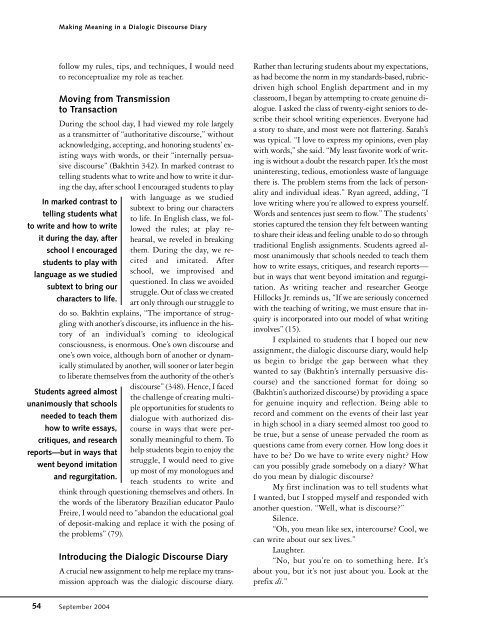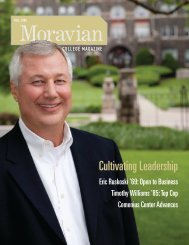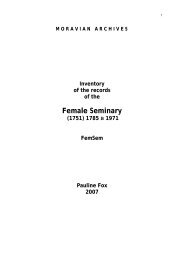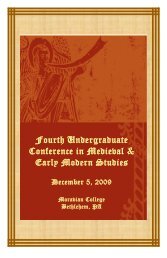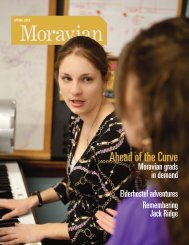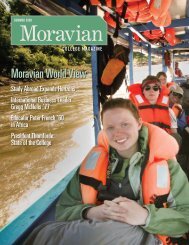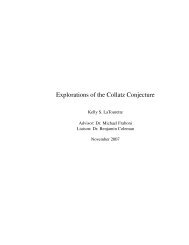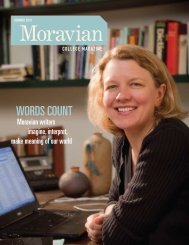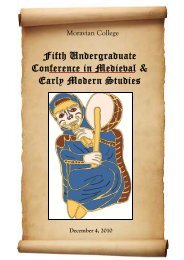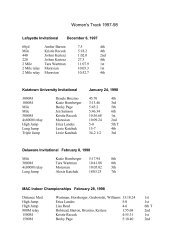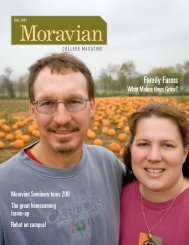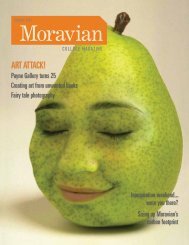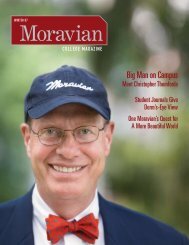Making Meaning in a Dialogic Discourse Diary - Moravian College
Making Meaning in a Dialogic Discourse Diary - Moravian College
Making Meaning in a Dialogic Discourse Diary - Moravian College
Create successful ePaper yourself
Turn your PDF publications into a flip-book with our unique Google optimized e-Paper software.
<strong>Mak<strong>in</strong>g</strong> <strong>Mean<strong>in</strong>g</strong> <strong>in</strong> a <strong>Dialogic</strong> <strong>Discourse</strong> <strong>Diary</strong><br />
follow my rules, tips, and techniques, I would need<br />
to reconceptualize my role as teacher.<br />
Mov<strong>in</strong>g from Transmission<br />
to Transaction<br />
Dur<strong>in</strong>g the school day, I had viewed my role largely<br />
as a transmitter of “authoritative discourse,” without<br />
acknowledg<strong>in</strong>g, accept<strong>in</strong>g, and honor<strong>in</strong>g students’ exist<strong>in</strong>g<br />
ways with words, or their “<strong>in</strong>ternally persuasive<br />
discourse” (Bakht<strong>in</strong> 342). In marked contrast to<br />
tell<strong>in</strong>g students what to write and how to write it dur<strong>in</strong>g<br />
the day, after school I encouraged students to play<br />
with language as we studied<br />
In marked contrast to<br />
subtext to br<strong>in</strong>g our characters<br />
tell<strong>in</strong>g students what<br />
to life. In English class, we followed<br />
the rules; at play re-<br />
to write and how to write<br />
it dur<strong>in</strong>g the day, after hearsal, we reveled <strong>in</strong> break<strong>in</strong>g<br />
school I encouraged them. Dur<strong>in</strong>g the day, we recited<br />
and imitated. After<br />
students to play with<br />
language as we studied<br />
school, we improvised and<br />
questioned. In class we avoided<br />
subtext to br<strong>in</strong>g our<br />
struggle. Out of class we created<br />
characters to life.<br />
art only through our struggle to<br />
do so. Bakht<strong>in</strong> expla<strong>in</strong>s, “The importance of struggl<strong>in</strong>g<br />
with another’s discourse, its <strong>in</strong>fluence <strong>in</strong> the history<br />
of an <strong>in</strong>dividual’s com<strong>in</strong>g to ideological<br />
consciousness, is enormous. One’s own discourse and<br />
one’s own voice, although born of another or dynamically<br />
stimulated by another, will sooner or later beg<strong>in</strong><br />
to liberate themselves from the authority of the other’s<br />
discourse” (348). Hence, I faced<br />
Students agreed almost<br />
the challenge of creat<strong>in</strong>g multiple<br />
opportunities for students to<br />
unanimously that schools<br />
needed to teach them dialogue with authorized discourse<br />
<strong>in</strong> ways that were per-<br />
how to write essays,<br />
critiques, and research sonally mean<strong>in</strong>gful to them. To<br />
reports—but <strong>in</strong> ways that help students beg<strong>in</strong> to enjoy the<br />
struggle, I would need to give<br />
went beyond imitation<br />
up most of my monologues and<br />
and regurgitation.<br />
teach students to write and<br />
th<strong>in</strong>k through question<strong>in</strong>g themselves and others. In<br />
the words of the liberatory Brazilian educator Paulo<br />
Freire, I would need to “abandon the educational goal<br />
of deposit-mak<strong>in</strong>g and replace it with the pos<strong>in</strong>g of<br />
the problems” (79).<br />
Introduc<strong>in</strong>g the <strong>Dialogic</strong> <strong>Discourse</strong> <strong>Diary</strong><br />
A crucial new assignment to help me replace my transmission<br />
approach was the dialogic discourse diary.<br />
Rather than lectur<strong>in</strong>g students about my expectations,<br />
as had become the norm <strong>in</strong> my standards-based, rubricdriven<br />
high school English department and <strong>in</strong> my<br />
classroom, I began by attempt<strong>in</strong>g to create genu<strong>in</strong>e dialogue.<br />
I asked the class of twenty-eight seniors to describe<br />
their school writ<strong>in</strong>g experiences. Everyone had<br />
a story to share, and most were not flatter<strong>in</strong>g. Sarah’s<br />
was typical. “I love to express my op<strong>in</strong>ions, even play<br />
with words,” she said. “My least favorite work of writ<strong>in</strong>g<br />
is without a doubt the research paper. It’s the most<br />
un<strong>in</strong>terest<strong>in</strong>g, tedious, emotionless waste of language<br />
there is. The problem stems from the lack of personality<br />
and <strong>in</strong>dividual ideas.” Ryan agreed, add<strong>in</strong>g, “I<br />
love writ<strong>in</strong>g where you’re allowed to express yourself.<br />
Words and sentences just seem to flow.” The students’<br />
stories captured the tension they felt between want<strong>in</strong>g<br />
to share their ideas and feel<strong>in</strong>g unable to do so through<br />
traditional English assignments. Students agreed almost<br />
unanimously that schools needed to teach them<br />
how to write essays, critiques, and research reports—<br />
but <strong>in</strong> ways that went beyond imitation and regurgitation.<br />
As writ<strong>in</strong>g teacher and researcher George<br />
Hillocks Jr. rem<strong>in</strong>ds us, “If we are seriously concerned<br />
with the teach<strong>in</strong>g of writ<strong>in</strong>g, we must ensure that <strong>in</strong>quiry<br />
is <strong>in</strong>corporated <strong>in</strong>to our model of what writ<strong>in</strong>g<br />
<strong>in</strong>volves” (15).<br />
I expla<strong>in</strong>ed to students that I hoped our new<br />
assignment, the dialogic discourse diary, would help<br />
us beg<strong>in</strong> to bridge the gap between what they<br />
wanted to say (Bakht<strong>in</strong>’s <strong>in</strong>ternally persuasive discourse)<br />
and the sanctioned format for do<strong>in</strong>g so<br />
(Bakht<strong>in</strong>’s authorized discourse) by provid<strong>in</strong>g a space<br />
for genu<strong>in</strong>e <strong>in</strong>quiry and reflection. Be<strong>in</strong>g able to<br />
record and comment on the events of their last year<br />
<strong>in</strong> high school <strong>in</strong> a diary seemed almost too good to<br />
be true, but a sense of unease pervaded the room as<br />
questions came from every corner. How long does it<br />
have to be? Do we have to write every night? How<br />
can you possibly grade somebody on a diary? What<br />
do you mean by dialogic discourse?<br />
My first <strong>in</strong>cl<strong>in</strong>ation was to tell students what<br />
I wanted, but I stopped myself and responded with<br />
another question. “Well, what is discourse?”<br />
Silence.<br />
“Oh, you mean like sex, <strong>in</strong>tercourse? Cool, we<br />
can write about our sex lives.”<br />
Laughter.<br />
“No, but you’re on to someth<strong>in</strong>g here. It’s<br />
about you, but it’s not just about you. Look at the<br />
prefix di.”<br />
54 September 2004


